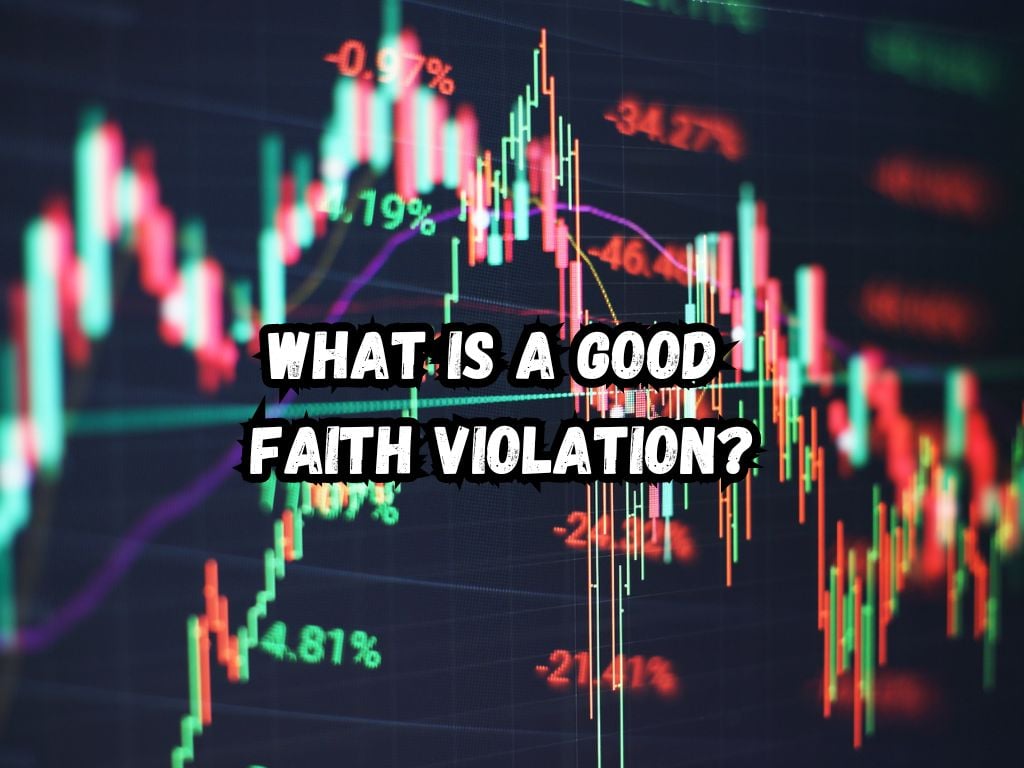Navigating the financial markets requires not only an understanding of market trends and investment strategies but also a keen awareness of the regulatory framework within which trades occur.
A critical aspect that traders, especially those operating within cash accounts, need to be familiar with is the concept of a good faith violation.
This article aims to demystify the notion of good faith violations, exploring their causes, consequences, and strategies for avoidance.
What Is a Good Faith Violation?
Good faith violations occur when traders sell securities bought with unsettled funds, then fail to hold onto those securities long enough for the purchase to be fully paid for with either deposited or settled funds.
In essence, it is a breach of the implicit contract to pay for stocks when funds to cover these purchases are not yet in the trader’s account.
It’s different from other trading violations due to its unique reliance on the settlement period, a concept foreign to many novices in the trading field.

The Mechanics Behind Good Faith Violations
Understanding good faith violations demands a grasp of the settlement period, a fundamental aspect of trading stocks. The settlement period refers to the time span between the execution of the trade and the day the participants must fulfill their obligations — for instance, by paying for a purchase or delivering sold assets.
Currently, the standard in the U.S. financial markets is the T+2 settlement cycle, which means transactions are settled two business days after the trade date.
Trading in a cash account follows strict rules. Traders must either have enough cash in their account to cover their purchase or wait for the sale of previously bought securities to settle before using those funds for another purchase. The violation emerges when this protocol is not followed.
Consequences of Good Faith Violations
The repercussions of committing a good faith violation can extend from slap-on-the-wrist penalties to more severe restrictions on a trader’s account. For instance, the brokerage might require the trader to have funds in their account before making purchases, fundamentally altering their trading approach.
Repeated violations can lead to the investor’s account being locked, limiting their activities to only trading with settled funds.
Brokerage firms and regulatory bodies view good faith violations through a serious lens, seeking to maintain market integrity and protect investor interests. They enforce rules designed to discourage the practice, thereby ensuring that trades are executed within the bounds of financial regulations.
Avoiding Good Faith Violations
To steer clear of good faith violations, traders should adopt best practices that align with the operational dynamics of the trading and settlement process. A useful strategy is the diligent monitoring of trade and settlement dates, ensuring that purchases are adequately funded without relying on the proceeds of unsettled sales.
Another consideration is the type of account being used for trading. While trading in a cash account comes with the possibility of good faith violations, utilizing a margin account can circumvent this issue.
Margin accounts allow traders to borrow against the value of the securities in their portfolio, providing instant liquidity to make new purchases without waiting for previous sales to settle. This flexibility, however, comes with its own set of risks and costs.
Case Studies and Real-World Examples
Consider John, a novice trader who sells a stock and uses the proceeds to buy another stock the very next day.
Because the sale hasn’t settled, and if John sells the newly bought stock before the funds from the initial sale have settled, he commits a good faith violation. This example highlights the importance of understanding and respecting the settlement period.

Frequently Asked Questions
What is the difference between a good faith violation and free-riding?
Good faith violations and free-riding both involve trading with unsettled funds, but free-riding specifically refers to selling securities before paying for the purchase, an action prohibited under Federal Reserve Board’s Regulation T.
How many good faith violations can occur before facing penalties?
This can vary by brokerage, but typically, a trader might be allowed up to three good faith violations in a rolling 12-month period before facing stricter penalties or account restrictions.
Can good faith violations affect my credit score or financial standing outside of trading?
Good faith violations are specific to trading activities and do not directly impact your credit score. However, financial habits indicative of risk-taking or mismanagement in trading could indirectly affect your overall financial health.
Are there any exceptions or waivers for first-time violators?
Some brokerages may offer education or a warning for first-time violators instead of immediate penalties. It’s essential to understand your brokerage’s policies on good faith violations.
Is it possible to dispute a good faith violation if it was made in error?
If you believe a good faith violation has been incorrectly applied to your account, you should contact your brokerage immediately to discuss the details of the transaction and seek a resolution.
In navigating the complexities of stock trading, an understanding of good faith violations plays a crucial role in maintaining both compliance and trading efficiency.
Through informed trading practices and a thorough understanding of the mechanisms behind trading settlements, investors can avoid the pitfalls associated with good faith violations and foster a more secure and profitable trading environment.
Conclusion
The consequences of good faith violations underscore the necessity for traders to familiarize themselves with the nuances of trading in cash accounts.
By adhering to trading rules and employing strategies to monitor transactions, traders can avoid these pitfalls. Stay informed, plan your trades wisely, and maintain compliance to ensure a smooth trading experience.


 Tags:
Tags:










